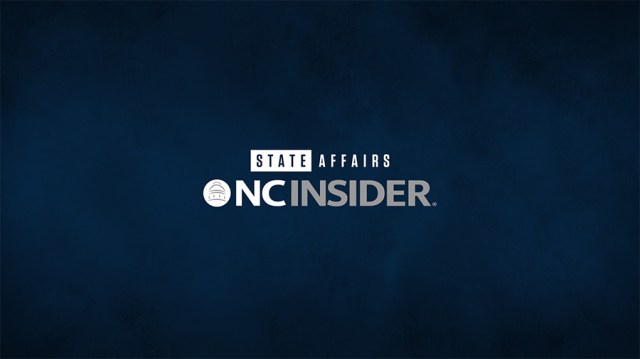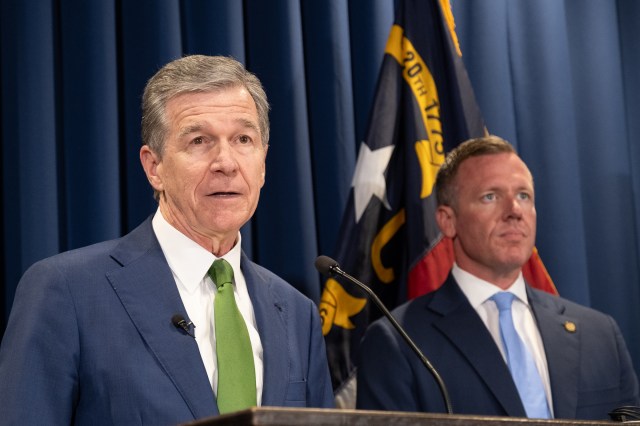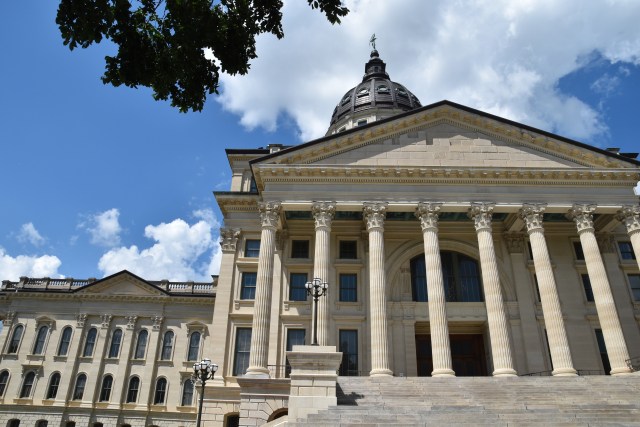Vote Potential
Mathew Sasser, State Affairs Pro, 9/05/24
Democratic state leaders didn’t mince words in voicing their opposition to potential votes on the Opportunity Scholarship school vouchers early next week in the General Assembly.
“These [Democratic] legislators hadn’t been told yet, but apparently they [Republican legislators are] coming back to take hundreds of millions of taxpayer dollars out of the public schools and give it to private school vouchers for the wealthiest North Carolinians,” Gov. Roy Cooper said Thursday afternoon.
Spokespersons for House Speaker Tim Moore and Senate President Phil Berger didn’t respond to requests for comment. Both the House and the Senate are scheduled to convene at noon Monday, but it’s unclear if votes will take place during that meeting.
Funding the Opportunity Scholarship appeared to be a top priority of the General Assembly ahead of this year’s short session. After months of discussion and the program’s inclusion in standalone bills and as part of this year’s budget amendment, neither chamber took action to send legislation to the governor.
Last year, the Republican General Assembly voted to eliminate income requirements for the voucher program, opening the program to nearly 72,000 applicants. Cooper said he expects the Legislature to provide $625 million in funding to clear the waiting list. He noted that the tax break would be difficult to repeal by future Legislatures, adding that many legislators are “caving in to the for-profit private school industry.”
Senate Democratic Leader Dan Blue said these vouchers aren’t about creating opportunities for low-income kids, particularly in rural areas, and questioned why Republican legislators have not committed to funding the Leandro Plan.
“No, the [Republican majority] has created a scam, a scam to use your tax dollars to send rich kids to unaccountable private schools,” Blue said, adding that 51% of Opportunity Scholarship applicants last year came from 10 North Carolina counties.
On the Senate floor in May, Sen. Amy S. Galey, R-Alamance, said those who oppose vouchers believe that families aren’t ultimately responsible for their children’s education. Sen. Benton G. Sawrey, R-Johnston, said that too many middle-class families are being squeezed by inflation and that school choice shouldn’t be the domain of the rich.
“What we’re saying is, until you take care of your basic needs [such as adequate public school funding], you can’t move onto the luxury,” House Democratic Leader Rep. Robert T. Reives II, said. “What we’re doing right now is we are taking care of other people’s luxury needs when 80% of our state has their children going to a school that we are not putting enough money in [to] stop mold, as we saw in one county.”
“We’re doing so little for public schools right now that, clearly, it would look to an observer like we are trying to shut down the public school system,” Reives continued, clarifying that he isn’t accusing anyone of dismantling public schools, but that appearance exists. Also attending the news conference on Thursday were Sens. Lisa Grafstein, D-Wake, and Michael Garrett, D-Guilford, and Wake County Reps. Cynthia Ball and Sarah Crawford.
RFK Ballots
Gary D. Robertson, The Associated Press, 9/05/24
A North Carolina judge refused to take Robert F. Kennedy Jr.’s name off presidential ballots in the battleground state on Thursday, a day before the first batches of November absentee ballots are slated to be sent to registered voters who requested them.
Wake County Superior Court Judge Rebecca Holt denied the temporary restraining order sought by Kennedy to prevent county elections boards from distributing ballots affixed with his name and requiring it to be removed. State law directs the first absentee ballots for the Nov. 5 elections be mailed to requesters starting Friday. A Kennedy attorney said the decision would be appealed and Holt gave him 24 hours, meaning counties likely won’t send out ballots immediately Friday morning. Kennedy got on the ballot in July as the nominee of the new We The People party created by his supporters. The elections board gave official recognition to the party after it collected enough voter signatures. But Kennedy suspended his campaign two weeks ago and endorsed Republican nominee Donald Trump. Since then the environmentalist and author has tried to get his name removed from ballots in several states where the race between Trump and Democratic nominee Kamala Harris are expected to be close.
In North Carolina, Kennedy and We The People of North Carolina wrote to the board asking for his name be withdrawn. But on a party-line vote Aug. 29 the board’s Democratic members denied the party’s request, calling it impractical given the actions already completed to begin ballot distribution on Sept. 6. Kennedy sued the next day.
North Carolina is slated to be the first state in the nation to distribute fall election ballots. County elections offices were expected Friday to send absentee ballots to more than 125,000 in-state and military and overseas voters who asked for them. And over 2.9 million absentee and in-person ballots overall had already been printed statewide as of Wednesday, state elections Executive Director Karen Brinson Bell said in an affidavit.
The process of reprinting ballots without Kennedy’s name and reassembling ballot requests would take at least two weeks, state attorneys said, threatening to miss a federal requirement that ballots be released to military and overseas voters by Sept. 21. But Kennedy lawyer Phil Strach argued in court that Kennedy complied with state law by presenting a written request to step down as the candidate, and that there’s another law allowing the ballot release be delayed under this circumstance. Otherwise, Kennedy’s free-speech rights in the state constitution forcing him to remain on the ballot against his will have been violated, Strach told Holt.
“This is very straight forward case about ballot integrity and following the law,” Strach said, adding that keeping Kennedy on the ballot would bring confusion to voters who thought he was no longer a candidate.
But Special Deputy Attorney General Carla Babb said the confusion would occur if ballot distribution was delayed, potentially forcing the state to have to seek a waiver of the Sept. 21 federal deadline. State laws and regulations gave the elections board the ability to reject Kennedy’s withdrawal based on whether it was practical to have the ballots reprinted, she said.
“Elections are not just a game and states are not obligated to honor the whims of candidates for office,” Babb told Holt.
In rejecting Kennedy’s request, Holt said that while the harm imposed upon Kennedy for staying on ballots is minimal, the harm to the state board with such an order would be substantial, such as the reprinting of ballots at considerable cost to taxpayers.
While Kennedy was still an active candidate, the North Carolina Democratic Party unsuccessfully challenged in court the state board’s decision to certify We The People as a party.
Kennedy on Wednesday sued in Wisconsin to get his name removed from the presidential ballot there after the state elections commission voted to keep him on it. Kennedy also filed a lawsuit in Michigan but a judge ruled Tuesday that he must remain on the ballot there. [Source]
NIL Rules
T. Keung Hui, The News & Observer, 9/05/24
North Carolina’s top public high school athletes are a step closer toward being able to earn money off their celebrity status. The State Board of Education gave preliminary approval Thursday to a proposed new rule that allows public school students to sign name, image and likeness deals beginning in the 2025-26 school year.
Pending public comments and a final board vote on Jan. 9, athletes could get paid starting in July.
Several state board members, though, were uncomfortable with the challenges that will come from allowing NIL agreements. “This is an extremely complicated issue,” state board vice chair Alan Duncan said during Wednesday’s discussion. “I would suggest to you once we walk down this road it will be extremely difficult to control.”
The state board will take public comments from Oct. 1 to Dec. 6. A virtual public hearing will be held at 10 a.m. on Nov. 8.
State board assistant general counsel Ryan Collins reminded the board that they could revise the rule or not approve it when it comes back for the January vote.
The mother of Faizon Brandon, the star quarterback at Grimsley High School in Greensboro, is suing the state board for not allowing NIL deals this school year. The family says the state is costing Brandon “a life-changing NIL opportunity.”
State lawmakers passed a law that went into effect in October that blocked the North Carolina High School Athletic Association from allowing NIL deals. Lawmakers said it should be up to the state board to allow NILs.
Lawmakers only gave the state board one month to discuss and act on a NIL policy for the 2024-25 school year, according to state board chair Eric Davis. “NIL is a complex issue that requires thoughtful guidance, and given the limitations for the temporary rule making, the board chose to maintain the status quo and not authorize NIL in the temporary rule,” Davis said Wednesday.
Since then, Davis said the board has worked with groups such as the NCHSAA to develop a new permanent rule that “gives us the best opportunity to safeguard the interest of students, their families and schools.”
Duncan, the board vice chair, added that they’re not voting on the new rule now because of the lawsuit. He said they’re having to act now due to the timeline for the state’s rule-making process.
State board member Olivia Oxendine said the ramifications from the NIL rule make it the most major decision she’ll make during her 11 years on the board. But Oxendine said that she felt like they’re talking about an issue that doesn’t necessarily fit the mission of public schools. “I’m not saying this is wrong,” Oxendine said. “It seems like a misfit to the purpose of public education, and public education is changing so I’ve got to plant that in my head too.” [Source]
Enrollment Data
Korie Dean, The News & Observer, 9/05/24
UNC-Chapel Hill’s newest first-year class includes a lower proportion of Black students compared to the previous year — a change that could stem from the U.S. Supreme Court’s decision last year to ban the consideration of race in college admissions.
The undergraduate class of 2028 is about 64% white, 8% Black, 10% Hispanic or Latino, 26% Asian or Asian American and 1% American Indian, the university announced Thursday. (Students self-report their racial and ethnic identities when they apply for admission. Some students may select more than one identity, which can result in a total higher than 100%.)
When the class of 2027 — whose students are now sophomores — entered the university last fall, the university said the class was 63% white, 11% Black, 11% Hispanic or Latino, 25% Asian or Asian American and 2% American Indian.
In all, the university welcomed 4,641 first year students and 983 transfer students this fall, the university announced.
UNC maintained throughout its nine-year defense of its admission policy that the university did not make admissions decisions solely based on race, but instead considered the information as part of its “holistic approach to undergraduate admissions.” But in the 2023-24 admissions cycle, for the first time in decades, the university was not allowed to consider applicants’ race in any way.
“It’s too soon to see trends with just one year of data,” Rachelle Feldman, UNC vice provost for enrollment, said in a statement Thursday. [Source]
Growth Report
Ray Gronberg, Business NC, 9/05/24
A recent report from one of four “chancellor initiative working groups” calls for adding 5,000 more undergraduates at UNC Chapel Hill over the next 10 years, split half and half between in- and out-of-state students.
The groups were formed earlier this year when Lee Roberts was the interim replacement for former Chancellor Kevin Guskiewicz, who is now president of Michigan State University. The reports shed light on the thinking of campus leaders; the report listed 15 members, including three trustees and 12 administrators or professors. After becoming the permanent chancellor, Roberts noted “The state is growing very rapidly, as we all know. Carolina has not grown very much. Only 3.5% of state high school graduates wind up at the university, he said.
Chapel Hill enrolled 20,681 undergraduates in the fall of 2023, which ranked fourth in the UNC System. N.C. State ranked first with 27,323, while UNC Charlotte and East Carolina held down the second and third slots. UNC Charlotte said Thursday it enrolled nearly 24,900 undergraduates this fall.
The Enrollment Planning Working Group also urges relaxing the 18% cap on out-of-state admissions. That would help North Carolina win the battle for talent and be smart financially because out-of-staters pay much higher tuition than in-state students.
“However, adding an equal number of residents and non-residents significantly increases revenue by a cumulative $327 million,” the report notes. “The additional funding from non-resident students will enable us to continue freezing tuition for resident undergraduate students and keep their education as free as practicable … without increasing the financial burden on North Carolina taxpayers.”
Working group members favor adding to UNC Chapel Hill’s graduate-student enrollment, but on a program-by-program basis and in keeping with “workforce and market demand, academic quality and financial sustainability.” They proposed no specific numerical target.
Adding students will mean investing “in sufficient faculty” and support services, upgrading and maximizing the use of existing classrooms and labs, and building more on-campus housing and dining, the report says.
The report rejected the idea of using online programs, noting that most students want a traditional Carolina experience.
Another working group looked at the possibility of adding an engineering school to Chapel Hill’s academic programs. The engineering report says that expansion would help the university and entire state by expanding engineering-school slots for high school graduates. It reckons that there are first-year seats in existing engineering programs across the state for about 4,052 North Carolinians. Assuming that 11% of high school graduates are interested in the field, there’s a potential demand for about 11,772 seats. As a result, many high school graduates opt to go out of state to study engineering, even as engineering-program enrollment at NC State, UNC Charlotte and N.C. A&T State University have shown rapid growth in the past 15 years.
Chapel Hill could add an engineering school without cannibalizing those existing programs, particularly given that the state ranks 32nd nationally for the percentage of bachelor’s degrees awarded in engineering.
The group urged expanding existing programs like computer science, biomechanical engineering (a joint offering with NC State) and applied physical sciences. It also suggests studying new programs in such fields as environmental engineering, materials science, polymer processing and computational medicine.
House Speaker Tim Moore has pushed fellow lawmakers to consider adding an engineering school at his alma mater. He is now running for Congress. The House’s proposed budget revisions for fiscal 2024-25 include an $8 million earmark to cover startup costs for a “College of Applied Science and Technology” at Chapel Hill. [Source]
Arena Plans
Bradley George, WUNC Radio and Tammy Grubb, The News & Observer, 9/05/24
UNC-Chapel Hill could renovate or replace the Dean Smith Center, the iconic home of Tar Heel basketball for nearly 40 years, as part of a larger effort to update the university’s building portfolio. An August report by the university’s Physical Master Plan Working Group lays out challenges for Carolina’s 544 buildings.
“Deferred maintenance and stalled projects are at a tipping point, with risk of more costly repairs and unsalvageable buildings. Enrollment increases will exacerbate this issue,” the report said.
The authors warn that inaction on these issues could lead to the “erosion” of UNC’s status as one of the nation’s premier public universities.
Student housing should be a major concern, according to the report. Dorms are at 99% occupancy, while the average age of these buildings is 78 years old. Many rooms are not accessible for people with disabilities; 37% lack central heating and air conditioning, according to the report.
The working group recommends the university conduct a housing study to determine bed count needs and prioritize construction or renovation projects within two years. The authors also cite the subpar standard of campus recreation facilities compared to peer institutions such as the University of Virginia and University of Wisconsin-Madison.
The report lays out six options for the Smith Center: tear down and rebuild on the current site, renovate the building, build a new venue at the Bowles Parking Lot or Odom Village, or build off campus at the Friday Center or Carolina North. The working group said renovating or rebuilding the Dean Dome on its current site would mean the men’s basketball team would have to play elsewhere during construction. The options for a new, off-campus arena are “not in safe walking distance” for students, the report said.
Funding for new building projects would be a major concern if university leaders decide to adopt the report’s recommendations. The authors urge the university to seek “regulatory relief and flexibility” from the UNC-Chapel Hill Board of Trustees and the University of North Carolina System’s Board of Governors to raise student fees, which are capped at 3%.
In related news, a $25 million capital campaign could put the UNC Hockey team on track to host fans at its own arena in Chapel Hill by 2028, organizers said. The project’s organizers are also working on naming rights for the 3,000-seat hockey arena, they said in a news release Thursday.
The N.C. Tar Heels Ice Hockey Booster Club, a nonprofit organization supporting UNC-Chapel Hill’s Ice Hockey Club, first announced the arena plans in October 2023. The group hasn’t filed an application yet with the town, but 4 acres are under contract at Carraway Village off Eubanks Road in northern Chapel Hill.
The UNC team plays about 18 games a year, and the arena could provide public skating and other activities, Morey has said. The group is “very pleased with the positive feedback” so far, current Booster Club President Colin Wahl said in a news release Thursday. [Source 1] [Source 2]
Tax Incentives
Fatima Hussein, The Associated Press, 9/05/24
Treasury Secretary Janet Yellen warned voters in the battleground state of North Carolina that they could lose jobs if Republicans weaken a signature Biden administration law that encourages investments in manufacturing and clean energy.
Yellen said that Republican-dominated states like North Carolina are greatly benefiting from tax incentives under the 2022 Inflation Reduction Act and that eliminating them would be a “historic mistake” in a Thursday speech at a community college in Raleigh.
Yellen said Treasury data shows that 90,000 North Carolina households claimed more than $100 million in residential clean energy credits and $60 million in energy efficiency credits.
“Rolling them back could raise costs for working families at a moment when it’s imperative that we continue to take action to lower prices,” Yellen said. “It could jeopardize the significant investments in manufacturing we’re seeing here and across the country, along with the jobs that come with them, many of which don’t require a college degree. And it could give a leg-up to China and other countries that are also investing to compete in these critical industries.”
“As we see clearly here in North Carolina, this would be a historic mistake,” she said. Some Republicans have called on their leaders to reconsider repealing IRA energy tax incentives. A group of 18 House Republicans in August called on House Speaker Mike Johnson to reconsider efforts to eliminate them.
The Republican case against the Inflation Reduction Act hinges on the argument that the spending is wasteful and benefits China.
IRS data released in August states that 3.4 million American families have claimed $8.4 billion in residential clean energy and home energy efficiency tax credits in 2023 — mostly towards solar panels and battery storage. [Source]
BBQ Lunch
Drew Jackson, The News & Observer, 9/05/24
One of the most powerful foodies in the world sat among the Thursday lunch crowd at Sam Jones BBQ in Raleigh — U.S. Secretary of the Treasury Janet Yellen. Of course, the Secretary’s influence lies not in Instagram followers, but in the U.S. Constitution. Guided by North Carolina Gov. Roy Cooper, a Democrat, Yellen sampled one of the state’s great delicacies from one of the country’s top practitioners of whole hog barbecue.
They each ordered pork barbecue sandwiches with slaw. Following Cooper’s example, Yellen also ordered a side of slaw to go with the sandwich. “I wasn’t going to, but then I thought, I have an expert here,” Yellen said of the Nashville, N.C.-born governor. “I’m a coleslaw connoisseur,” said Cooper, who also professes to be a diet soda sommelier.
“This coleslaw is excellent. It’s more on the finely chopped, sweeter side. It’s really good.”
Sam Jones BBQ is owned by Sam Jones and Michael Letchworth and is rooted in one of North Carolina’s historic restaurants, Skylight Inn in Ayden. The visit wasn’t a political stop, but endorsements were made. Yellen reached for the vinegar squeeze bottle, the style associated with the eastern part of the state.
“I really love North Carolina barbecue,” Yellen said. “I like the vinegar-based sauce and the coleslaw was delicious — that’s the best I’ve had.” Yellen has a reputation as a bit of a food aficionado, with The New York Times calling her a “culinary diplomat.”
She shrugs off the “foodie” characterization. “I eat in a lot of restaurants, I don’t know about ‘foodie,’” Yellen said. Earlier this year, whole hog barbecue from Sam Jones was served to Japanese Prime Minister Fumio Kishida at the Governor’s Mansion. As a parting bit of advice, Cooper stressed to Yellen that in North Carolina, barbecue grammar is historically important. “Just know that I told Secretary Yellen that in North Carolina, barbecue is a verb and not a noun,” Cooper said. [Source]
DMV Funding
Lucas Thomae, Carolina Public Press, 9/05/24
A DMV appointment is a rarity in North Carolina right now, especially in the state’s largest metro areas. None of the seven offices in Wake County have any availability for the next 90 days, according to the NCDMV website on Sept. 3. Every drivers license office in the state accepts walk-ins each weekday after 12 p.m. on a first-come-first-served basis. However, the accommodation is not enough to meet the demand coming from the state’s largest metro areas.
“It’s become clear that we just don’t have enough people,” North Carolina DMV spokesperson Marty Homan told Carolina Public Press.
The agency says it needs the state legislature to allocate more entry-level positions, something that has not happened in the last 20 years. The DMV’s latest request for new positions was not included in the most recent state budget.
To compensate for the understaffing, the agency has occasionally let some offices “borrow” workers from larger ones. Commissioner Wayne Goodwin lamented the situation in an Aug. 31 post on X, formerly known as Twitter, after the DMV announced it had indefinitely closed two rural offices in Laurinburg and Raeford because of staffing shortages. Each office was meant to be staffed by two people but struggled to operate efficiently while dealing with vacant positions.
“The unfortunately necessary ‘robbing Peter to pay Paul’ approach that has been used for two decades has reached its breaking point,” Goodwin’s post read.
Homan told CPP that the issues are not the result of a high vacancy rate, which has actually dropped from around 25 percent just a couple years ago to just over 10 percent now. It’s simply that there’s not enough positions in the first place.
For example, the Raleigh East office was built to accommodate 14 full-time employees, but right now it only has eight positions. As a whole, the seven Wake County DMV offices only have one permanent vacancy out of 54 full-time positions.
The agency has introduced a number of solutions to ease wait times, which Homan said typically peaks in the summer and back-to-school seasons. For 12 weeks during the summer, the DMV introduced Saturday walk-in hours from 8 a.m. to noon at 16 locations across the state. 17,000 North Carolinians took advantage of those Saturday availabilities, which ended Aug. 24.
The DMV is going to once again request that state legislators during the 2025 General Assembly long session allocate funding for new positions, Homan said. Meanwhile, DMV is considering additional solutions that might temporarily ease the pressure, including extending the agency’s Saturday hours or staying open an extra hour or two in the evenings. [Source]
Grocery Overcharging
David Mildenberg, Business NC, 9/04/24
Sarah Taber, who seeks to oust five-term Agriculture Commissioner Steve Troxler in the November election, says systemic overcharging by North Carolina retailers is an “important piece of the puzzle” behind high grocery prices.
The Democratic Party candidate contended in a recent podcast with U.S. Rep Wiley Nickel that “it’s fairly common to go into a store and get a pound of bananas, and you will be charged a pound and a quarter.” She noted it isn’t “every chain, not every store,” but added that “a lot of grocery stores across the state have been systematically overcharging people.”
Asked about her comments, Taber told Business North Carolina in an emailed statement that “of course grocery costs are high for many different reasons, but I think that this is an important piece of the puzzle.” She added that “we’ve seen that corporations don’t play fair unless there’s someone watching them. Sometimes scales fall out of calibration due to normal use, but inaccurate scales still result in overcharging the customer.”
Andy Ellen, CEO of the N.C. Retail Merchants Association, called Taber’s comments “very disturbing. It’s disappointing that she thinks these companies would intentionally treat their customers this way.” Higher food prices reflect inflation’s impact on energy, wages and other input costs, Ellen says. “The grocery industry runs on a 1% to 3% profit margin, which is one of the lowest that is out there.” He noted that bananas are often used as a “loss-leader” for groceries, priced at a low price to attract customers to their stores.
Taber said on the podcast that the state ag department should be more aggressive in regulating scanners and scales. “North Carolinians don’t know that their government should protect them when they’re at the checkout machine,” she said.
Troxler said his department has about 20 inspectors who check price scanners and weighting devices at retail locations, including grocery stores. “We make sure that these devices are working properly before we let go of a case,” he said in statement. “Some states do not have anybody inspecting these devices, but we are fortunate in North Carolina to have a team focused on these inspections,” he added. “We don’t find fraud, we find a lack of staffing in stores and stores not paying attention to pricing changes.”
Inspectors are seeing a 5.6% failure rate this year, down from 10.7% last year, Troxler said.
The department periodically shares news of fines related to price-scanning errors. In July, nine stores were fined for the errors, including six Family Dollar sites and Dollar General, Target and Walgreens locations. [Source]
Dem Campaigning
WFAE News and Jessica Banov, The News & Observer, 9/05/24
On Wednesday, North Carolina Democrats held a virtual press conference about how the upcoming election could impact reproductive freedoms.
Ahead of Republican candidate Donald Trump’s visit to Charlotte on Friday, state democrats are taking an offensive charge with state representatives.
During a virtual press conference, Sens. Natalie Murdock, Sydney Batch, and reproductive rights advocates said Donald Trump’s election could further limit reproductive rights in the state. Batch noted Republicans in the state legislature already limited most abortions to 12 weeks.
“Trump wants to go farther,” Batch said. “He wants to ban abortion before most women even know that they’re pregnant.”
Last year, in North Carolina a federal judge allowed the state’s abortion law to stand. Previously abortion was legal in the state for up to 20 weeks.
Earlier this week, Sen. Kirsten Gillibrand (D-NY) joined other leaders in Charlotte to blast Trump’s economic proposals. North Carolina is back in play as a swing state since Vice President Kamala Harris became the Democratic nominee, with polls showing the race in a dead heat.
Second Gentleman Doug Emhoff will visit North Carolina next week on behalf of his wife, Vice President Kamala Harris, according to an announcement the campaign provided to The News & Observer. He’ll be joined by Gwen Walz, the wife of Harris’ running mate, Minnesota Gov. Tim Walz, as part of a “Fighting for Reproductive Freedom” bus tour.
The bus tour, which started Tuesday in Palm Beach, Florida, is scheduled to make two stops in North Carolina, including one with the candidates’ spouses.
First, the bus tour will stop in Asheville on Sunday and will spotlight “women who have been impacted by Trump’s abortion ban,” according to the campaign. Emhoff and Gwen Walz are not scheduled to appear in Asheville, but will “headline” an event in Raleigh on Monday.
The tour is expected to make 50 stops, the Harris-Walz campaign said. [Source 1] [Source 2] |



 Save the Date
Save the Date


